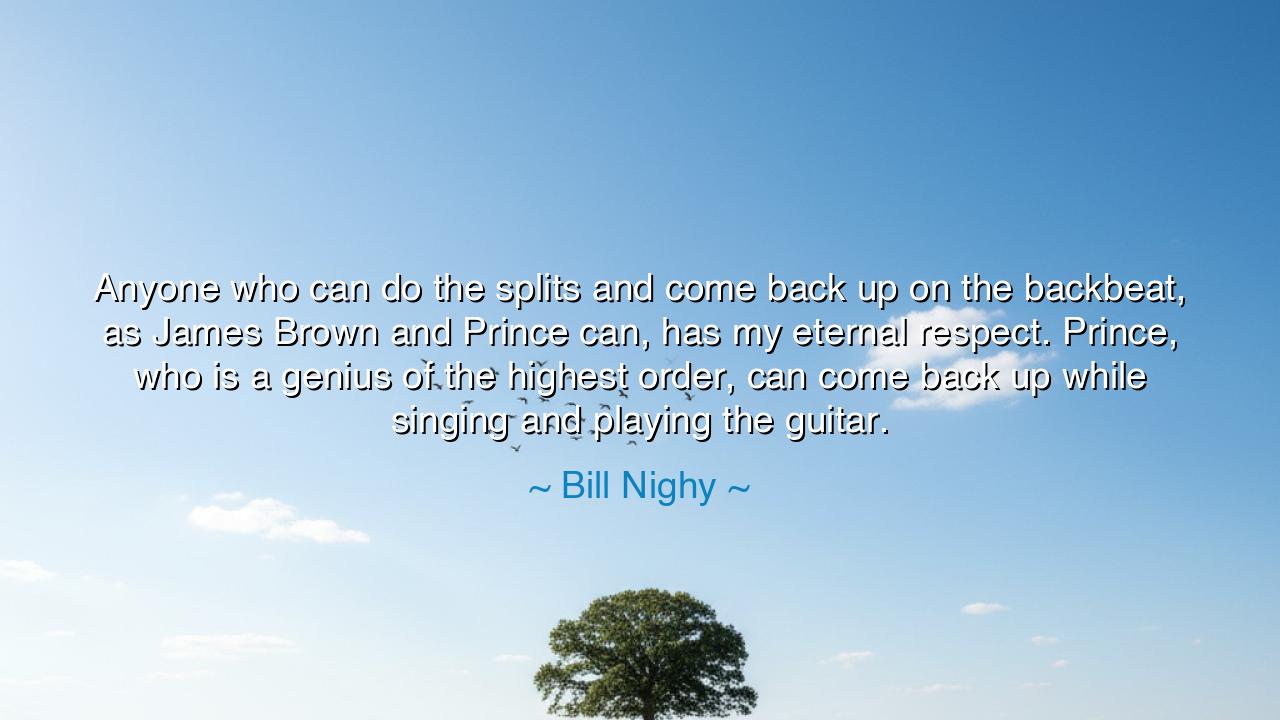
Anyone who can do the splits and come back up on the backbeat, as
Anyone who can do the splits and come back up on the backbeat, as James Brown and Prince can, has my eternal respect. Prince, who is a genius of the highest order, can come back up while singing and playing the guitar.






The words of Bill Nighy—“Anyone who can do the splits and come back up on the backbeat, as James Brown and Prince can, has my eternal respect. Prince, who is a genius of the highest order, can come back up while singing and playing the guitar.”—are not merely about dance or spectacle. They are an ode to mastery, to discipline, and to the divine fusion of body, rhythm, and spirit. In them we hear reverence for the performer who embodies not just skill, but transcendence—the ability to command art so fully that it seems effortless, though born of countless hours of sweat and pain.
The ancients spoke often of those rare souls who bridged the worlds of flesh and spirit through performance. The Greek athletes, who trained their bodies until they moved like poetry, were honored as demi-gods. The musicians of old, who could stir the heart with lyre and voice, were said to channel the muses. In our age, James Brown and Prince stand in this lineage: artists whose very bodies became instruments, whose movements were as much music as their sound. To fall to the ground in a split and to rise again on the backbeat is not just agility—it is perfect union with rhythm, a feat that demands respect because it fuses discipline with ecstasy.
Consider the life of James Brown, the “Godfather of Soul.” His shows were not concerts alone, but rituals of energy where sweat poured like holy water and every stomp of his foot was a sermon. To watch him was to see a man possessed by rhythm, commanding both his band and his audience with gestures that were part music, part magic. His famous splits and recoveries were not stunts, but visual expressions of his control—he fell and rose with the beat itself, as though his body was the drum. That is why, as Nighy says, respect is eternal: such mastery is rare.
And then there is Prince, whom Nighy calls “a genius of the highest order.” Prince was more than a musician—he was a force of nature. To play the guitar with fire, to sing with unbroken passion, and in the very same moment to fall and rise in perfect time—this was not simply performance, it was transcendence. Prince seemed to exist beyond the limits of ordinary flesh, channeling both the sensual and the divine. His mastery was not accidental, but the fruit of devotion, of a life given wholly to music. That is why Nighy, himself an artist, speaks of him not with envy, but with awe.
The deeper meaning of this quote lies in the recognition of genius. True genius is not confined to thought or talent alone—it is the fusion of many gifts, embodied with courage. To command respect is not to be flawless, but to give oneself so completely to one’s craft that the line between the artist and the art dissolves. Brown and Prince remind us that genius is not timid; it is bold, embodied, and unafraid to risk ridicule for the sake of beauty and truth.
From this, we learn a vital lesson: whatever your craft may be, pursue it with the fullness of your being. Do not hold back, do not settle for half-measures. Respect is not earned by intention alone, but by the living proof of discipline married to passion. If you are a writer, write with the same abandon that Prince played. If you are a teacher, teach with the fire that James Brown carried to the stage. Genius may not be given to all, but dedication is within reach of every soul.
Practical action is simple, though demanding: give yourself wholly to what you love. Train the body, the mind, and the spirit until they move as one. Respect those who achieve greatness not with envy, but with inspiration—let their example fuel your own pursuit of excellence. And when you rise from your own “splits”—the failures, the stumbles, the moments of collapse—rise on the backbeat of life, in rhythm with perseverance, and continue your song.
So let Bill Nighy’s words be remembered as more than admiration—they are a hymn to the sacred union of art and effort. James Brown and Prince showed us that respect is not demanded, but earned in the crucible of discipline and the fire of performance. Let us walk their path in our own way, daring to give our all, so that one day, others may look upon our work and say with reverence: here, too, is eternal respect.






AAdministratorAdministrator
Welcome, honored guests. Please leave a comment, we will respond soon